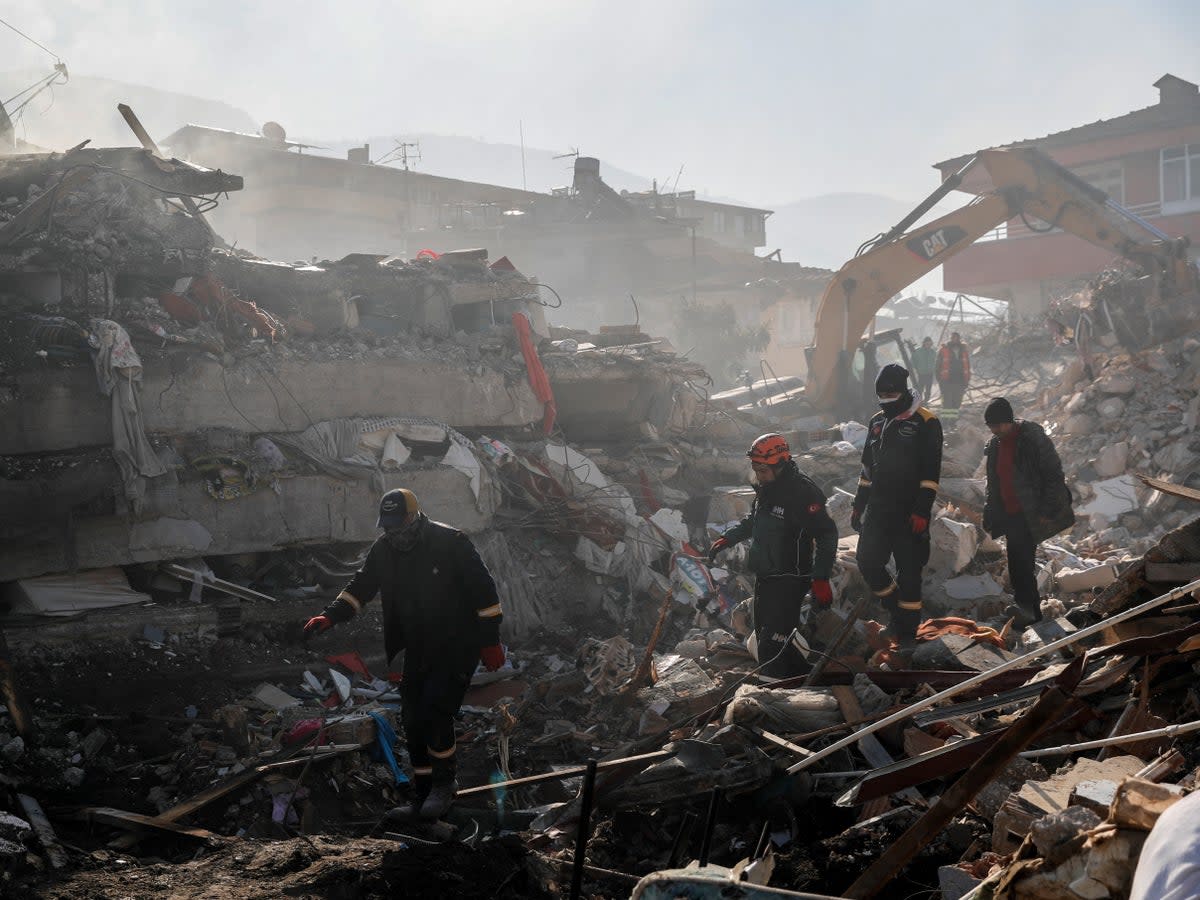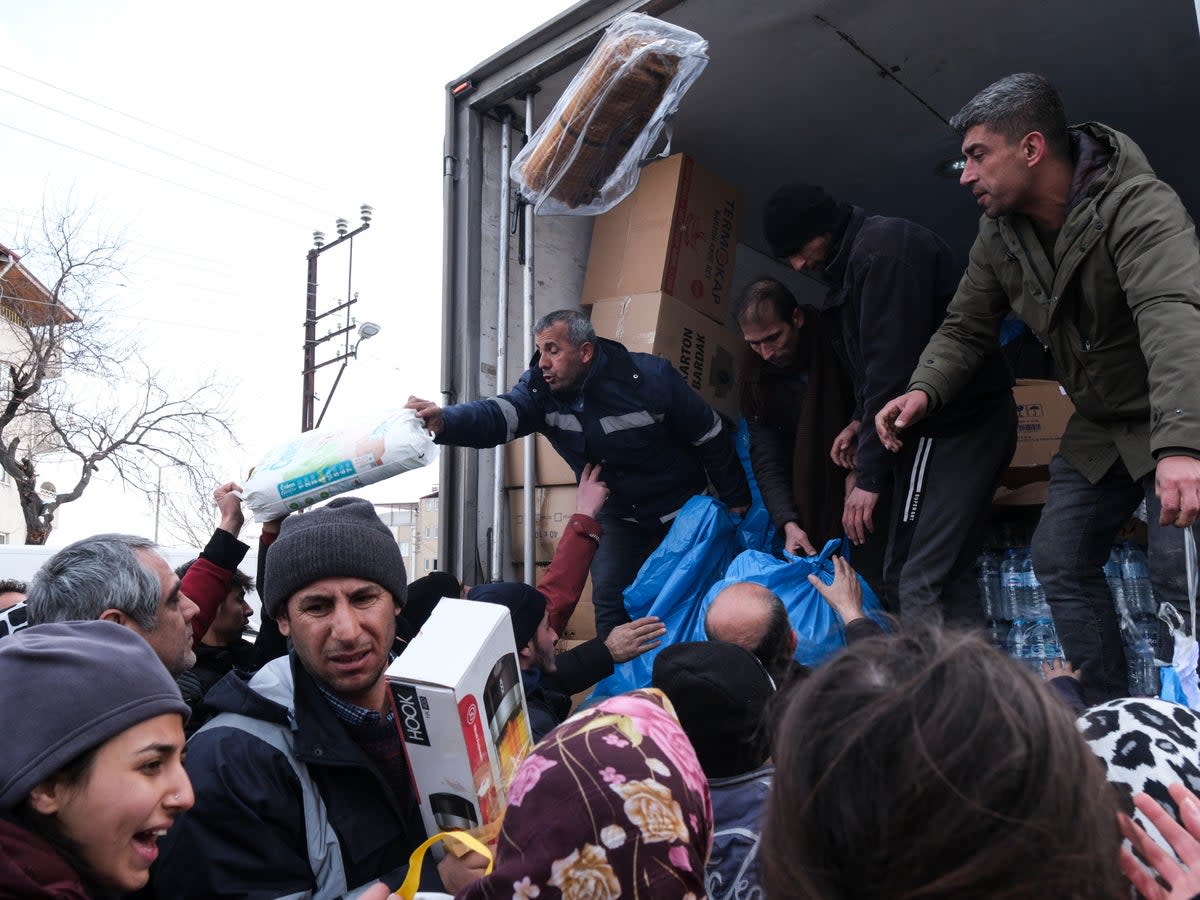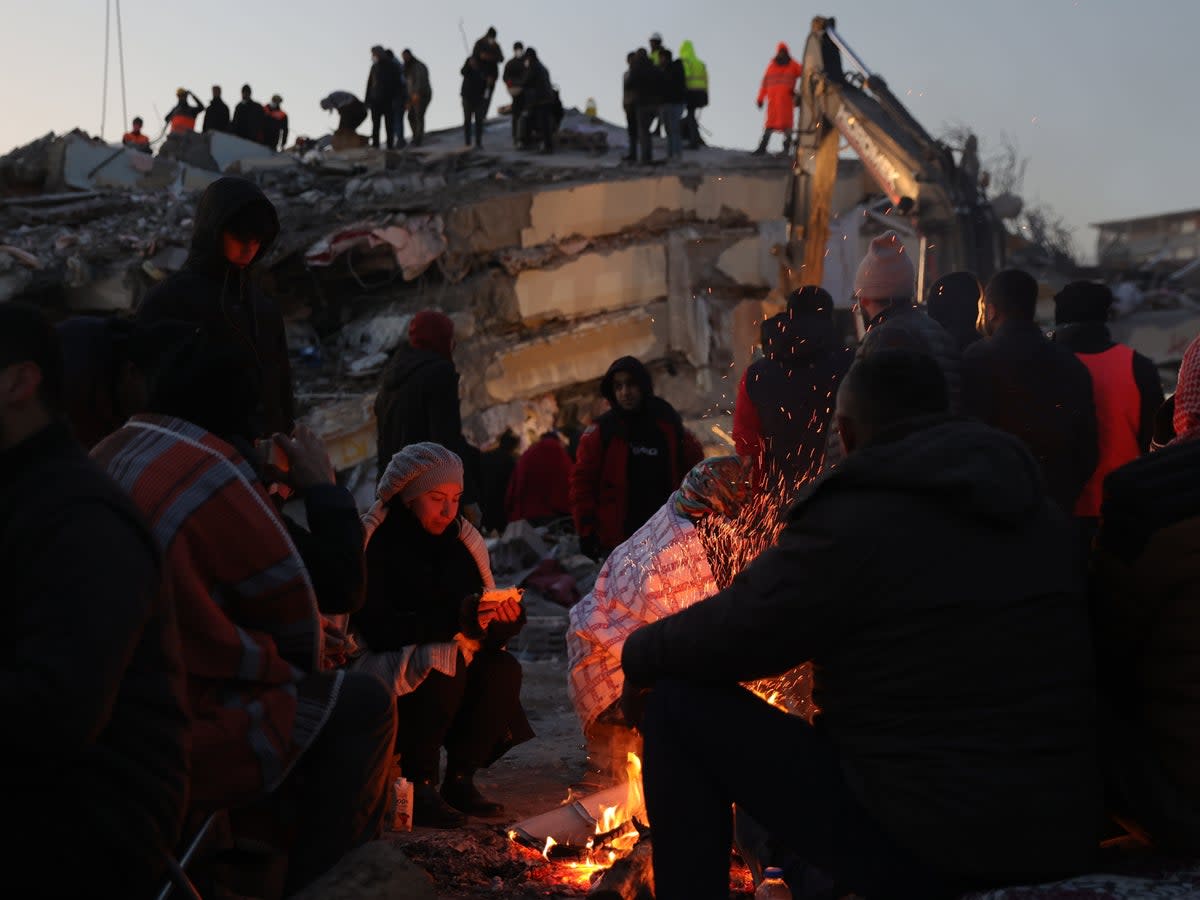‘Where is the state?’ Erdogan faces anger of his people over Turkey earthquake relief

Anger is growing across Turkey to the way president Recep Tayyip Erdogan’s government has handled the response to the devastating series of earthquakes and aftershocks that have left more than 16,000 dead in the country and made tens of thousands more homeless.
Rescue workers and residents in both Turkey and Syria – where thousands more have died – are still searching for survivors of the earthquakes, which struck heavily-populated regions of both countries. But the political recriminations have already begun, with presidential and parliamentary elections having been scheduled – at least for now – on 14 May.
More than 13 million, or 15 per cent, of Turkey’s 85 million people across 10 provinces have been impacted by the disaster, with Erdogan and his Justice and Development Party (AKP) facing accusations from earthquake survivors that the official response has been slow and uneven, especially in regions politically loyal to opposition parties. "Where is this state?" the Karar newspaper blared in a headline.
“The government has not prepared for an earthquake for 20 years,” said Kemal Kilicdaroglu, leader of the opposition People’s Republican Party, in a video. “If there is one person responsible for this, it is Erdogan.”
Erdogan has been accused of briefing municipal officials of the AKP but shunning representatives of Kurdish and centre-left opposition parties which control many of the local governments in the stricken zone. The president has taken to the airwaves to complain about politically motivated “fake news” related to the earthquake.
“We are closely monitoring those who intend to set our people against each other with fake news and distortions,” he said earlier this week. “This is not the day to argue with them. But we will open the notebook that we hold now when the day comes.”
His government also ordered telecommunications providers to block access to Twitter for fear it could be used to spread unspecified “disinformation” – before consulting with executives of the company and restoring access into Thursday. The disruption to a platform being used to communicate distress calls and offers of aid, received an angry response, including from political opponents.
“What kind of evil is this?” opposition leader Meral Akesner said in response to the Twitter outage. “Of whom and why are you afraid? Shame on you!"
Erdogan may have good reason to worry. The then-Turkish government’s botched response to a 1999 earthquake in the country’s northwest – which killed more than 17,000 people – helped catapult him and the AKP to power. The May elections were already set to be the toughest Erdogan has faced during his two decades in power.

Erdogan has deployed some 9,000 troops to aid in relief efforts. He has also declared a three-month state of emergency in the afflicted provinces, giving his government special powers that could allow him to clamp down on political activity in ethnic Kurdish regions that are hostile to him.
“The government is trying to protect itself instead of organising intervention and aid,” the Kurdish-led People’s Democratic Party (HDP) said in a statement. “What needs to be done is not a declaration of state of emergency, but a social alliance.”
The response to the earthquake has tarnished Erdogan’s image as a problem-solver. Over the years, he has thrived in crises, often appearing on the scene to oversee relief efforts.
“Before, you’d see him as one of the first ones at the devastation scenes,” said Hetav Rojan, a Copenhagen-based scholar and security expert focused on Turkey. “He’d be talking to frontline workers and conferring with people at the local mosque. He was the social organiser. But the Erdogan we saw in the first days of the earthquake wasn’t the Erdogan of the past. He was avoidant and defensive.”
Public anger has mounted. Even tightly controlled broadcast media have cut away during live broadcasts as survivors have hurled vicious insults about the government’s response. In Turkey’s Adiyaman, the minister of transport, Adil Karaismailoglu, and the governor, Mahmut Cuhadar – both Erdogan appointees – were forced to get in their vehicles and leave one visit after angry citizens began kicking their vehicles.

Erdogan has admitted shortcomings in the government’s response but said such fumbles were unavoidable. Government supporters noted that even the United States has botched responses to natural disasters such as Hurricane Katrina in 2005. “It’s not possible to be ready for a disaster like this,” Erdogan said on Wednesday as he visited a tent encampment for displaced survivors near the quake epicentre.
He has urged Turks to come together and avoid political recriminations while delivering aid to the disaster areas. Outside of Erdogan, it is clear the disaster has brought those in Turkey and across the world together in an effort to get money, volunteers and supplies to survivors huddling in freezing winter weather.
But Erdogan’s critics say he is the one who is playing politics with aid. A major problem cited by Turks is that Turkey’s relief efforts and contributions from abroad and the rest of the country are centralised through the Disaster and Emergency Management Authority (Afad), a state organisation that is Erdogan’s brainchild. Critics say the very structure of Afad is aimed at making the government look strong while hampering both international organisations and local municipalities from quickly providing aid. The government have dismissed such suggestions.
“He calls for people to ‘stand by me’ whenever he causes ruin in this country,” said Kilicdaroglu, a possible challenger to Erdogan in upcoming elections. “But there is no need for my solidarity with Erdogan and his palace.”
Kilicdaroglu said he has asked officials to distribute supplies without coordinating with central authorities who he accused of mostly being interested in improving Erdogan’s political prospects. He urged municipal authorities to do so even if it meant being arrested for violating protocol.

“We will move the necessary aid as fast as possible to the places where it is needed the most,” he said.
The earthquake spells other troubles for Erdogan. The country was already suffering from a grave economic crisis exacerbated by what critics have described as Erdogan’s erratic rule and insistence on keeping interest rates low, aggravating an inflationary spiral that has increased the cost of living and depleted the value of savings. The earthquake damage will cost Turkey billions, slashing the country’s 2023 growth forecasts.
Turkey’s low interest rates were meant in part to curry favour with developers to unleash a housing and development boom meant in part to shore up Erdogan’s political base. But urban planners, architects and seismologists have long warned of the potential dangers around construction projects, with Turkey sitting upon several of the world’s most unstable fault lines.
Erdogan’s justice minister, Bekir Bozdag, has vowed to prosecute builders and contractors whose shoddy work may have contributed to the mounting death toll. But Erdogan and the AKP’s relationship with developers has already begun to come under scrutiny.
But perhaps the biggest political impact the earthquake may have is on Turkish national identity. Or at least as it has been packaged by Erdogan to his supporters for much of the second half of his two-decade reign. Over the years, he has increasingly doubled down on hardcore Turkish nationalism. He has argued that the bridges, mosques, airports and apartment towers that have risen under his rule are the envy of the world, and especially the European Union and the West.
In recent months, he has flexed Turkey’s muscles repeatedly threatening historic rival Greece with military action and loudly refusing to allow Sweden and (to a much lesser extent) Finland to join Nato.
But after the earthquake, Erdogan has found himself needing help from those he has stood against. Israel, a frequent target of Erdogan and his supporters, dispatched a 150-person search-and-rescue team to the stricken city of Adana. Greek rescuers were also quickly on the scene, helping pull survivors from the wreckage. Even Armenia, which has strained relations and no formal diplomatic ties with Ankara, dispatched dozens of rescuers. The same EU officials Erdogan often disparages as meddlesome interlopers were in Ankara on Thursday with hefty offers of help for Turkey.
“He’s painted himself into a corner by being so adamant about Turkey’s strategic autonomy,” says Rohan. “Now he’s in dire need of outside help. That’s difficult to digest for a Turkish voter, who has heard Erdogan say for years that Europe is envious of our achievements, standards and industries.”
